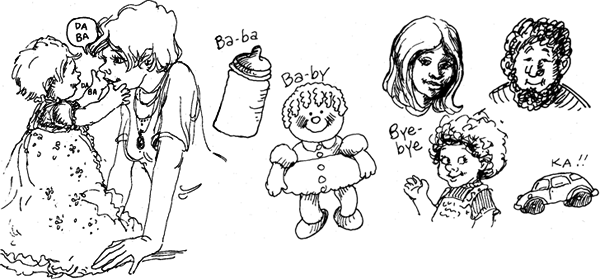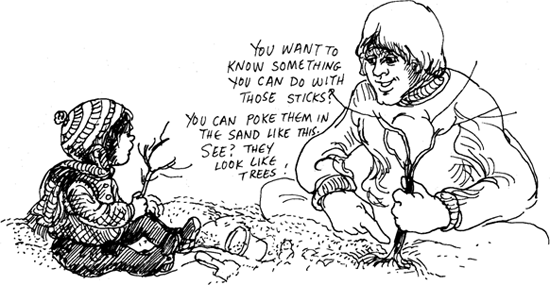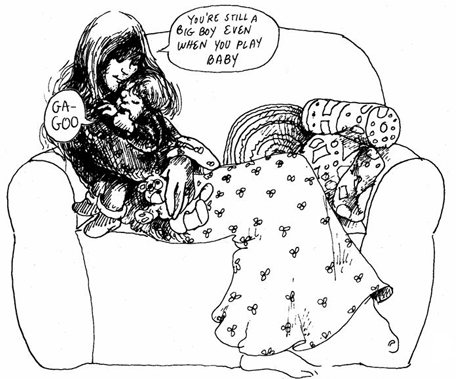|


Of all the things that supertots learn, language is the most remarkable. Think of it: at age one a child can say only two or three words, but at age three the same child has a vocabulary of up to a thousand words - words to ask questions, give explanations, describe things, express feelings, greet people, fantasize, and sing. The world opens up with words.
But knowing the meanings of words does not necessarily give children the ability to communicate. They have to learn to pronounce them, make sentences with them, and to listen to the words of others. They have to want to use words, want to talk, and feel that others want to talk with them. Over and over again, all day long, day after day, you have the opportunity to talk casually with your child and convey the sense that communication between people is a vital part of life.
How to teach your child to talk
|
|
 |
|
|
Talk about things before your child learns to talk. |
|
Be interested in your child's
first sounds. |
|
Don't talk baby talk. |

When your child starts making two-syllable sounds with each syllable sounding different, enjoy this amazing progress and talk back. A magic moment occurs when your child, with your help, connects sounds he or she makes with people and objects in the outside world. Soon your child has a working vocabulary, and you can really talk together. True, you may only have five shared words at this point but the list will grow rapidly if you enjoy talking together.
Talk about the world around you

Talk with your child and listen to his or her comments, be they babbling sounds or real words. Sometimes, when your child gets better at saying real words, you can correct the pronunciation; but, in general, forget about perfection and let your "conversations" come naturally. New words, phrases, and eventually sentences will be learned by your child at his or her own speed in his or her own time. The main thing is attitude: your child should feel that he or she wants to talk with you and that you want to talk with him or her.
Talk about what you see your child doing

Sounds simple, but it's not; helping children learn is an art. You cannot make your child learn something unless he or she wants to. So wait, listen, watch, and think about what's going on when your child is playing. Then, when you get on the same wavelength, make a few suggestions.
Good teachers know the secret of learning; there's no reason why you shouldn't know it too. After all, it's true that parents are a child's first teachers.
Learning takes place when a child wants to learn something and the teacher knows what the child wants to learn and helps.
Talk about routines
Children like their daily routines, and they like to talk about what's familiar. Conversation with them can make certain boring routines more interesting to you.
Waking up
How many ways can
you say hello?
|
|
Mail call
Mailtime presents an opportunity to talk
about the mailman, the mail truck, and what
came today: letters, magazines, newspapers, junk mail, and stamps.
|
|
|
Getting dressed
This is a good time to talk about colors, stripes, snaps, zippers, previous owners of hand-me-downs, and pictures on jerseys.
|
|
Washing hands
Think of all the words
you
get to teach:
clean/dirty, before/after, finished/not finished,
all done/not all done,
wet/dry. |
Mealtime
Tastes, smells, colors,
textures, cooking tools,
eating utensils, feelings of hunger and satiety:
there's a lot to talk
about at mealtime. |
|
Going out
Kids like to repeat the names of everything being puton them and why. |
|
|
Naptime
Talk about what you
did this morning
and what you'll do
together
after the nap.
|
|
Picking up
Think of picking up as a long-range goal that is taught in small
incremental steps.
Don't ask for too much
too soon, but get the
point across that toys eventually have to be
picked up and that
you will help. |
Chanting

Supertots love to repeat things over and over. This talent can drive you nuts unless you find a way to live with it. Making up chants is one way. You start, and your child listens and joins in. Here are a few basic chant patterns to use in different situations.
Variations
The Who-wears-mittens Chant:
...Daddy wears mittens. Mommy wears mittens. Matt wears mittens. Cloe wears mittens. And who else?
...Cookie Monster wears mittens.
The Who-gets-mad-sometimes Chant:
...Daddy gets mad sometimes. Mommy gets mad sometimes. Grandma gets mad sometimes.
...David gets mad sometimes. Eva gets mad sometimes.
Even Mr. Rogers gets mad sometimes.
Playing baby

As supertots get older, they sometimes like to play baby. The nice thing about playing this "game" with your child is that you get to acknowledge his or her periodic returns to babyhood and teach your child that inner feelings are something that you can handle.
Why?

Someday it will happen. Your child will start asking you why. Why do I have to take a nap? Why do I have to eat hamburger? Why are you going out? Why is Grampa sleeping? You feel honor-bound to offer reasonable explanations so that your child will catch on to the order of things. You need to nap so you won't be tired later this afternoon. You need to eat hamburger because it's good for you. I'm going out to the store to buy some milk. Grampa is sleeping because he's very tired. That's enough. Longer explanations are tiresome; children want to know a lot but not very much in depth. If they keep on asking why, keep answering in simple sentences. But if you sense that they're asking just to get your attention, then say so and get out of the trap either by giving your child some undivided attention or by saying "Because" and changing the subject.
CLICK HERE for Chapter Three: Favorite Things to Do |

